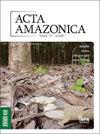Copaiba (Copaifera reticulata) oleoresin reduces voluntary alcohol intake in rats
IF 0.8
4区 环境科学与生态学
Q4 ECOLOGY
引用次数: 0
Abstract
ABSTRACT Copaiba oleoresin, extracted from the Copaifera reticulata tree, has been used as a remedy in popular medicine in the Brazilian Amazon for various purposes, including reducing drug abuse. Yet no studies evaluated the effect of repeated administration of copaiba oil on alcohol consumption in animals. To evaluate this effect, we divided adult male Wistar rats into a) an alcohol group in which the animals had free access to choose between two bottles: one containing alcohol solution (20%) and another containing vehicle solution (0.2% saccharin); and b) a control group with access to two bottles containing vehicle solution. Rats were free to drink 24 h per day, for 35 days. Daily alcohol consumption and weekly body weight gain and food intake were monitored. From day 22, half of the rats in each group received 600 mg kg-1 copaiba oleoresin and the other received vehicle, subcutaneously, once a day, for three days. On day 35, rats were evaluated in an open-field test. The results showed that copaiba oil decreased voluntary alcohol intake and preference between days 2 and 6 after the last administration. Copaiba treatment also decreased the food intake and body weight gain in both alcohol and control groups without changing behaviors in the open-field test. Therefore, copaiba oil was able to reduce voluntary alcohol consumption in rats and could be tested in humans as an adjuvant to treat alcohol use disorder.Copaiba (Copaifera reticulata)油树脂减少大鼠自愿酒精摄入量
Copaiba油树脂是从Copaifera reticulata树中提取的,在巴西亚马逊地区的流行药物中被用作多种用途,包括减少药物滥用。然而,没有研究评估反复服用可帕伊巴油对动物酒精消耗的影响。为了评估这种效果,我们将成年雄性Wistar大鼠分为a)酒精组,其中动物可以自由选择两瓶:一瓶含有酒精溶液(20%),另一瓶含有载体溶液(0.2%糖精);b)对照组获得两瓶汽车溶液。大鼠每天24小时自由饮水,连续35天。每天的酒精摄入量、每周的体重增加和食物摄入量都被监测。从第22天开始,每组一半大鼠皮下注射600 mg kg-1 copaiba油树脂,另一组皮下注射载药,每天1次,连续3天。第35天,采用空地试验对大鼠进行评价。结果表明,在最后一次给药后的第2天至第6天,copaiba油减少了自愿酒精摄入量和偏好。Copaiba治疗还减少了酒精组和对照组的食物摄入量和体重增加,而没有改变他们在野外测试中的行为。因此,copaiba油能够减少大鼠的自愿饮酒量,并且可以在人类身上进行测试,作为治疗酒精使用障碍的辅助剂。
本文章由计算机程序翻译,如有差异,请以英文原文为准。
求助全文
约1分钟内获得全文
求助全文
来源期刊

Acta Amazonica
PLANT SCIENCESECOLOGYZOO-ECOLOGY
CiteScore
1.70
自引率
0.00%
发文量
34
审稿时长
22 weeks
期刊介绍:
Acta Amzonica is a multidisciplinary, peer-reviewed, open access, free-of-charge scientific journal for research in and about the Amazon region, published since 1971 by the Instituto Nacional de Pesquisas da Amazônia - INPA, in Brazil.
The journal publishes quarterly issues containing articles and short communications in English across a broad range of disciplines, including Agronomy and Forestry, Animal Sciences and Fisheries, Biodiversity and Conservation, Biotechnology, Chemistry and Pharmacology, Environmental Sciences, Food Sciences, Geosciences, Health Sciences, Human and Social Sciences, and Materials Technology.
 求助内容:
求助内容: 应助结果提醒方式:
应助结果提醒方式:


